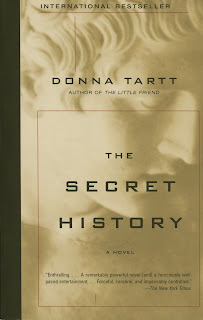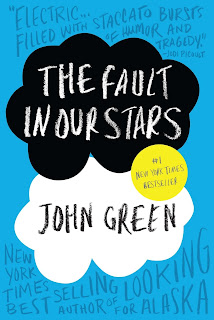The Desire to Lose Control has its Consequences
The Secret History Review
By Sithmi
Donna Tartt
truly has a way with words. Like Richard says, “a morbid longing for the
picturesque at all costs” is what creates the imagery in this book. Everything,
down to details of the fabric and colour of leaves is described in the utmost
beautiful way. Its gorgeous and you can envision it all unravel in front of
your eyes.
Narrated by
Richard Papen, we are introduced head-first into the cause of this story, a
death of a friend. Quickly, we learn of our narrator’s past and his desire to
enter the elite Greek class led by the illustrious professor Julian Morrow, and
his elusively poised students, Henry Winter, Edmund (Bunny) Corcoran, Francis
Abernathy and the twins, Charles and Camilla Macaulay. We are emerged in the
story, going from his entry to the course to and induction of the students. We
learn of their behaviours as 28 year old Richard tells us his story as he
reminisces his otherworldly college experience.
Tartt’s
writing style is descriptive, detailed, and she tells us all we needs to know
about the characters through their mannerisms and little quirks. We travel
through the first part in a haze, smiling and laughing along with the ancient
jokes, drunken behaviour of these odd college kids. Even with the planned death
of Bunny, we follow through, nodding our heads, agreeing that the death was
necessary. Once we reach the ending, only do we snap to focus of what has
happened.
The second
part of the novel, the aftereffects, the ripples, the struggles, are the most
crucial pieces. The death touches each of their lives and keeping the charade
alive turns out be so deadly. As one another turn on each other, and start
picking sides, lines are drawn, and the worry becomes real. If not the guilt,
it is the haunting misery that pierces them. The death indeed happened, and
they began to question what drove them to it. In the heat of this questioning,
several events tumble forward, and quickly it is a downward spiral to the abyss
of darkness that awaits them. The revelations come through Charles’s drunken
behaviour and dark misdeeds, Henry’s endeavours and murky intent, Francis’s
want to keep the peace, Camilla’s wish to be free and in love and Richard’s
sleepless nights filled with haunting nightmares.
As we are
without warning, launched into the ending, we gasp in shock at the abruptness.
Nobody wants things to end this quickly, this wretchedly. And so, the trigger
is pulled several times and we wonder of the fate they all could have had if
things had been different, if they hadn’t killed Bunny, if they hadn’t lost
control of themselves that fateful night. Only then do we start to really question the motive behind their actions, their desperate reasoning and logic, conclusions drawing to evil intent.
The finality
of things is bold with the ending Tartt chose to leave it at. The epilogue
itself is extremely sad, as Richard tells us what happened to the remaining
members of the Greek class and all the other prominent characters from this
story. When we learn of the depressed lives they live, we are struck with the cold
slap of reality that life indeed goes on, stopping for no one and nothing. That
it is not always sweet endings but sometimes miserable unending days to go through
for the rest of your life. It’s the tone of the epilogue, that convey that
nothing could possibly go right for them, no hope now and that they had their “better
days”. While we are barely aware this is unusual for anyone to lead such lives with such tragic and evil pasts, the ending makes it feel like anyone could have been living these lives. That it would always come to this horrifyingly monotonous point.
This book explores several themes, that intertwine with each other: guilt, envy, manipulation, control, isolation, class, death. There are also several good discussions within the pages that question our reality and our societies. Each of the main characters' personality represents a theme. Richard with his desire to fit in with this exclusive crowd and be known. Marrow with his deliberate isolation of his students and so on.
And when reading this amazing story, I recommend listening to orchestral pieces. Mainly, The Secret History by The Chamber Orchestra of London and Danse Macabre by Camille Saint-Saëns. It really adds to the tear jerking ending. This is by far, one the most, interestingly dark academic, dare I say it, and beautiful stories I have ever read. Sure, this might be a popular and cliched opinion, but it has the evidence to back it up. It becomes a tragic comedy the more times you read it, but it will not fail to break you by the end.
Writing Style rating: 5/5
Plot rating: 5/5
Total rating: ⭐⭐⭐⭐⭐




Comments
Post a Comment